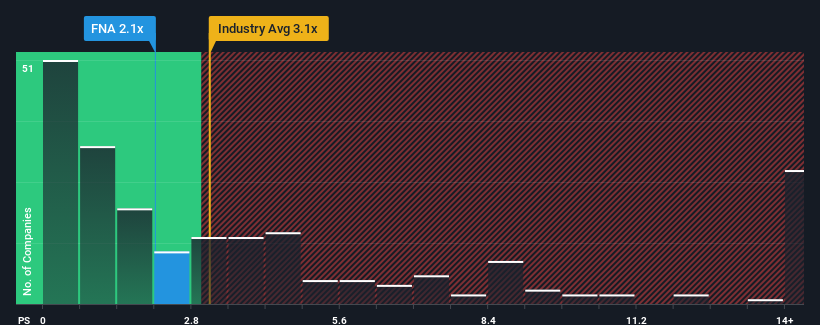- United States
- /
- Medical Equipment
- /
- NYSE:FNA
It's Down 28% But Paragon 28, Inc. (NYSE:FNA) Could Be Riskier Than It Looks

Paragon 28, Inc. (NYSE:FNA) shareholders won't be pleased to see that the share price has had a very rough month, dropping 28% and undoing the prior period's positive performance. Instead of being rewarded, shareholders who have already held through the last twelve months are now sitting on a 49% share price drop.
Following the heavy fall in price, Paragon 28's price-to-sales (or "P/S") ratio of 2.1x might make it look like a buy right now compared to the Medical Equipment industry in the United States, where around half of the companies have P/S ratios above 3.1x and even P/S above 7x are quite common. However, the P/S might be low for a reason and it requires further investigation to determine if it's justified.
Check out our latest analysis for Paragon 28

How Paragon 28 Has Been Performing
With revenue growth that's superior to most other companies of late, Paragon 28 has been doing relatively well. One possibility is that the P/S ratio is low because investors think this strong revenue performance might be less impressive moving forward. If the company manages to stay the course, then investors should be rewarded with a share price that matches its revenue figures.
If you'd like to see what analysts are forecasting going forward, you should check out our free report on Paragon 28.How Is Paragon 28's Revenue Growth Trending?
The only time you'd be truly comfortable seeing a P/S as low as Paragon 28's is when the company's growth is on track to lag the industry.
Taking a look back first, we see that the company grew revenue by an impressive 17% last year. The strong recent performance means it was also able to grow revenue by 75% in total over the last three years. So we can start by confirming that the company has done a great job of growing revenue over that time.
Shifting to the future, estimates from the six analysts covering the company suggest revenue should grow by 16% over the next year. Meanwhile, the rest of the industry is forecast to only expand by 9.0%, which is noticeably less attractive.
In light of this, it's peculiar that Paragon 28's P/S sits below the majority of other companies. Apparently some shareholders are doubtful of the forecasts and have been accepting significantly lower selling prices.
The Key Takeaway
The southerly movements of Paragon 28's shares means its P/S is now sitting at a pretty low level. We'd say the price-to-sales ratio's power isn't primarily as a valuation instrument but rather to gauge current investor sentiment and future expectations.
A look at Paragon 28's revenues reveals that, despite glowing future growth forecasts, its P/S is much lower than we'd expect. When we see strong growth forecasts like this, we can only assume potential risks are what might be placing significant pressure on the P/S ratio. It appears the market could be anticipating revenue instability, because these conditions should normally provide a boost to the share price.
You need to take note of risks, for example - Paragon 28 has 3 warning signs (and 1 which is a bit concerning) we think you should know about.
Of course, profitable companies with a history of great earnings growth are generally safer bets. So you may wish to see this free collection of other companies that have reasonable P/E ratios and have grown earnings strongly.
New: Manage All Your Stock Portfolios in One Place
We've created the ultimate portfolio companion for stock investors, and it's free.
• Connect an unlimited number of Portfolios and see your total in one currency
• Be alerted to new Warning Signs or Risks via email or mobile
• Track the Fair Value of your stocks
Have feedback on this article? Concerned about the content? Get in touch with us directly. Alternatively, email editorial-team (at) simplywallst.com.
This article by Simply Wall St is general in nature. We provide commentary based on historical data and analyst forecasts only using an unbiased methodology and our articles are not intended to be financial advice. It does not constitute a recommendation to buy or sell any stock, and does not take account of your objectives, or your financial situation. We aim to bring you long-term focused analysis driven by fundamental data. Note that our analysis may not factor in the latest price-sensitive company announcements or qualitative material. Simply Wall St has no position in any stocks mentioned.
About NYSE:FNA
Paragon 28
Develops, distributes, and sells foot and ankle surgical systems in the United States and internationally.
Imperfect balance sheet very low.
Similar Companies
Market Insights
Community Narratives




